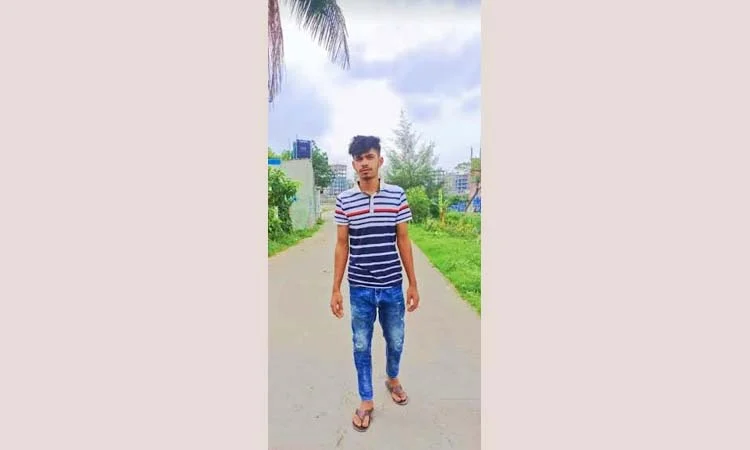News Flash
News Flash

NARAYANGANJ, April 29, 2025 (BSS) – July 19, 2024, dawned like any other summer morning, but it became a day of unspeakable grief for many families across the country. The ‘Complete Shutdown’ called by the anti-discrimination student movement was being observed on Chittagong Road in Narayanganj.
People from all walks of life took to the streets responding to the call of the student movement against discrimination. Some held posters and festoons in their hands, wore a band of the national flag of the red sun surrounded by green on their heads, and some shouted slogans—they demanded an end to all discrimination, fair and equal rights, and equal dignity. But the state chose the path of cruel repression to silence their voices.
The sound of gunfire had been shaking the air and sky in the Chittagong Road area of Narayanganj since that morning. Following firing from helicopters, exploding cocktails, and chases and counter-chase—the entire area turned into a terrifying battlefield.
Amid that chaos, 23-year-old Sajal, who had taken shelter inside a tea stall to escape the fatality, was fatally shot by police.
Sajal, son of Abdul Hamid and Runa Begum, was the eldest among their four siblings. He had shouldered his family responsibilities from his early life.
Sajal worked at a shoe factory with his father in the Chittagong Road area.
He joined the job leaving behind his education with a dream of ensuring a better livelihood for his family.
He was a gentle and responsible young man. His younger siblings, Raifa (17), Rubina (14), and Ibrahim (11), are still studying in a madrasah.
Recalling the memories on that fateful day, Runa Begum said she knew that Sajal secretly joined the protests.
“Even though I scolded him, I didn’t forbid him to join the movement. But on that day I felt an unusual anxiety. We were hearing the sound of gunfire even from our home,” she recounted with an emotion choked voice. Runa remembered that the night before, she had pleaded with her son, “Don’t go out, my son. Whenever I see your face, I get scared”.
On July 19, she said after lunch, she asked Sajal to sleep beside her, instead of going outside.
“I’ll sleep beside you, maa. I’m just stepping out for a bit,” Sajal replied to his mother. Tragically, it was his last words to his mother and never returned to sleep beside her, but in the grave.
Sajal's mother is still in deep grief losing her beloved eldest child, which has also left her mentally devastated.
Whenever his mother obstructed him from going to the movement, Sajal used to tell her, “Maa, we all have to take to the streets for the country, no one is safe even at home. If I die, you will be the mother of a martyr. Think of it as my fate.”
“Now my son is sleeping in the grave making me the mother of the martyr. I can’t accept anyway that he will never return to sleep beside me,” weeping Runa said.
Recalling the horrors on that day, Sajal’s father Abdul Hamid said he was near Madani Nagar Madrasa on that day when he saw someone dead on the Dhaka-Chittagong highway, someone lost an arm and someone lost a leg.
“The whole highway was stained with blood,” he recalled.
“At that time, when I went to rescue a boy lying on the road, police started indiscriminate firing. Later, I somehow managed to take the body inside an alley in the area,” Hamid said.
Meanwhile, he said, he picked up his phone to check the time, and saw 55 missed calls from an unknown number.
“When I called back immediately, someone from the other side told me that one of my relatives had been taken to Sugandha hospital. Hearing the news, I trembled in fear. I knew that my son Sajal and brother Mamun were outside,” Hamid recalled with an emotion choked voice.
He said he somehow managed to reach the hospital through different alleys as a terrible situation was prevailing across the streets.
“When I reached the hospital, I saw a cloth covering his face. When I removed the cloth, I saw it was my son's body. Immediately, I fell onto the ground losing my consciousness,” Hamid said while he was seen trying to control his emotion.
Later, they brought Sajal’s body to their village home at Shalmodi in Araihazar here on the same night and buried him at their village graveyard.
Hamid said they didn’t join the movement to get government jobs.
“We only wanted to oust tyrant Hasina from the government. Going to oust Hasina, I lost my son. We gained freedom by sacrificing my son,” he said.
On this Eid-ul-Fitr, Sajal’s mother spent the whole Eid day mourning for her son.
“Sajal was my first child. He gave me the taste of being a mother. I missed his call “Maa” this Eid,” Runa sobbed.
She said Sajal used to love Biryani on Eid day. “I cooked Biryani too on this Eid day for my younger son, but I couldn’t take it thinking of Sajal,” she wailed.
Since Sajal’s martyrdom, his family received Taka 2 lakh from Jamaat-e-Islami, Taka 2 lakh from the district administration and Taka 5 lakh July Shaheed Smrity Foundation as financial assistance.
Yet, for Runa Begum, no amount of money can fill the void. “Can money bring my son back?” she asked tearfully.
Each morning, she looks at the door, still hoping to hear Sajal’s voice saying, “Maa (mother), would you like to eat something? Let's go, I'll get something from the market.” But silence and heartbreak greet her instead.
In her final words, Runa Begum demanded justice. “I want justice for my son's murder. I want to see those oppressors, who killed my son, punished before I die”.